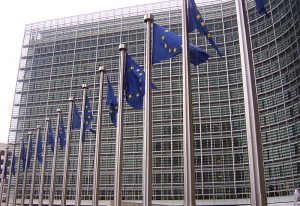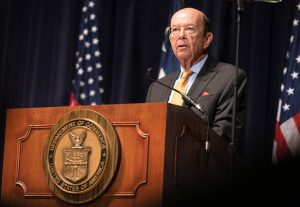The EU is a heavyweight – but it must join forces and step up the cohesion of its economic area to compete with the US, argues Klaus D. Oehler….

Wikimedia / (CC BY-SA 2.0)https://creativecommons.org/licenses/by-sa/2.0/deed.de
Donald Trump has a clear goal: Make America great again. The US President repeats his election slogan tirelessly. But his often controversial and unusual methods and decisions are having an effect. The US economy is actually doing well, not least because of the tax cuts, but also because of protectionist measures Trump wants to enforce to boost domestic industry. Whether all this is necessary and how sustainable this turnaround will be – politicians and economists are arguing about it. The US President doesn’t seem to care much about critical voices. He prefers to refer to his balance sheet. And that’s something to be proud of: Only recently, online giant Amazon rose to become a company with a market capitalization of a trillion dollars. This makes it the only company in the world besides Apple that has ever reached this value. What the companies have in common, apart from their market power, is their network of customers, which – thanks to digitization – can be expanded almost infinitely. The European companies closest to the trillion dollar mark are SAP with 142 billion dollars and Royal Dutch Shell with 271 billion dollars, which makes it the most valuable European company. In order to give their economy a boost, according to experts recently quoted in the newspaper “Die Welt”, closer cooperation between the states in addition to facilitating market access is called for.

EU Commissioner for Trade, Cecilia Malmström
16683410920_9e14caa877_o / Flickr / Friends of Europe / Attribution 2.0 Generic (CC BY 2.0) / https://creativecommons.org/licenses/by/2.0/
Differences in performance
It is equally difficult to predict how the relationship between the long-standing “close friends”, the US and Europe, will develop. Almost at the last minute, the President of the EU Commission, Jean-Claude Juncker, negotiated a compromise with Trump that averted punitive tariffs on German cars to be sold in the US. The outgoing convinced European Juncker is the one who sees more opportunity than risk for the European Union in the new relationship with Washington. In early September, in a much-noted speech before the European Parliament in Strasbourg, he presented his vision of a united Europe. The EU is a sovereign power that represents half a billion people and has enormous economic power, Juncker said. He added that nationalism had never solved problems.
This reference was important because a trend towards nationalist governments has increased in Europe in recent years. The first trigger was the euro crisis, in which both sides felt disadvantaged in the end by the measures taken in Brussels and the decisions taken by individual EU governments. Some felt patronized, others did not want to pay so much for the rescue of other states. Later, there was the refugee crisis, to which the governments also reacted differently; a common European solution could only be achieved in part. Juncker also admits all this: there is no convincing single foreign and security policy and even the monetary union is stagnating because of the all too great differences in economic performance. However, the heads of state and governments were able to agree on a banking union, a first step forward. The president of the EU Commission also made it clear that a country that wanted to leave the Union could not only benefit from the advantages a membership offers – a clear signal to London, where the Brexit is still controversial. Juncker’s proposals for reforming the EU envisage that majority decisions should make the EU more able to act in foreign and financial policy terms. Migration is to be managed efficiently with a mix of legalization and consistent repatriation. A new partnership with Africa – also to combat the causes of flight – should complement this. As a global currency, the euro should finally be brought into line with the US dollar.

US Secretary of Commerce, Wilbur Ross
U.S. federal government / Public Domain
Economists, however, regard this goal difficult to achieve. “Different regions do not have the same economic power, be it in terms of growth trends or innovative capacity; they also do not have the same political power, and that is the real challenge,” says Philippe Waechter, chief economist of an asset manager belonging to Natixis Investment. The international reference currency is the currency of the dominant political power. He recalls Japan having a strong economy in the eighties. “But its currency never competed with the dollar because of political weakness … And the same could be said of Europe, which does not manage to dictate strong political decisions in the long run,” says Waechter.
But it should now be clear to everyone involved that competition in the globalized world will be fought out primarily between three triads in the future: America, Asia with a strong China, and Europe. The Europeans, with their high export ratio, should above all be interested in strengthening the cohesion of their economic area. Many German industries, for example, now account for 60 to 80 percent of sales abroad – only free world trade can bring further growth in the long term.
Klaus D. Oehler is the financial editor at the daily Stuttgarter Zeitung
